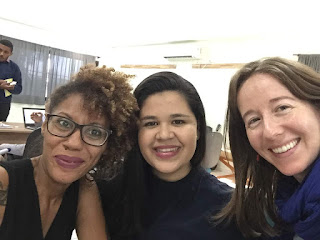Last week, I had the wonderful opportunity to join the Plan International Brazil leadership team on a strategy planning retreat. The retreat took place in a city 75km from São Paulo at a former orphanage that was run by one of Plan's partner organizations. The organization has now turned the campus into lodging and meeting space for retreats and conferences. It provided the perfect, peaceful setting to focus on long days of planning the future of Plan Brazil.
The goal of the retreat was to determine how to align the on-the-ground activities with the new strategy of Plan’s programs. The organization recently decided to focus its work on promoting girls’ rights and equality for girls. Plan has over 20 years of experience advocating for children’s rights in Brazil, but started programs specific to gender equality just in 2012. With leaders from every program unit in various states and managers from the national office, we discussed the details of how to achieve Plan Brazil’s new vision of “a fair and just Brazil for all girls.”
One of the challenges we discussed in attaining Brazil’s vision is resistance or push back from community members and community organizations regarding the focus on gender. Plan works in rural cities where gender roles tend to be rigid and many girls stop studying in middle or high school to help with housework at home. One of the core goals of Plan is to change social norms around gender roles, increasing the number of young women who obtain secondary and higher education. Plan includes fathers and mothers in activities to help girls challenge gender roles at home, in addition to reaching out to community leaders and policymakers. It was encouraging to see a report come out during the retreat from the World Bank titled “The High Cost of Not Educating Girls.” The data show that girls who complete secondary education can expect to earn twice as much as those with no education; studies like this can help get community leaders on board with Plan’s mission.
The CEO arranged for a morning of team-building activities with an outside consultant. One of the highlights was an exercise in which the group was divided into three groups and tasked with putting together an “evening news program” to present. Each group presented the perspective of either Plan staff, Plan leadership, or Plan clients in a 5-minute skit. During the debrief, the facilitator explained that parody and humor is a powerful tool in helping an organization reflect on its strengths and weaknesses. He noted that important issues surfaced in our hyberbolic skits that likely would not have been brought up in a more serious discussion. I thought this was an entertaining and useful activity to bring to future teams and organizations. It was also my debut acting in Portuguese; I was awarded “Best Actress"-- I think to compensate for the entire staff laughing at my Portuguese!
After 3 long days that were both exhausting and energizing, we came back to São Paulo with new ideas, friendships, and a clear vision for working towards a fair and just Brazil for all girls.










No comments:
Post a Comment